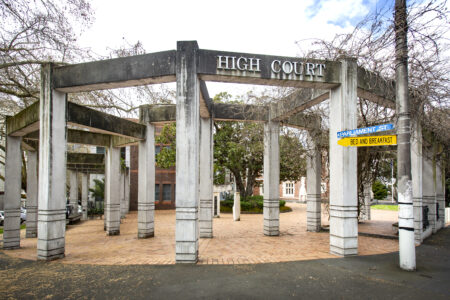
The law enforcement agency that laid charges against seven people over political donations is defending its decision to prosecute after the Court of Appeal overturned all but one of their convictions.
Yikun Zhang, Shijia (Colin) Zheng and his twin brother Hengjia (Joe) Zheng went on trial alongside former Botany MP Jami-Lee Ross and three defendants whose names are suppressed in front of Justice Ian Gault in the Auckland High Court last year.
The Zheng brothers are understood to live in east Auckland and according to the NZ Companies Office they’re connected to properties in Flat Bush and Pakuranga.
The Serious Fraud Office (SFO) accused Zhang, the Zhengs and Ross of allegedly taking part in a fraudulent scheme to split two large donations made to the National Party in 2017 and 2018 into smaller amounts so the identity of the true donor or donors was not disclosed as legally required.
Zhang and the Zheng brothers also faced charges, along with two men and a woman whose names are suppressed, over a 2017 donation to the Labour Party.
At the trial’s conclusion, Gault acquitted the three defendants who have name suppression of all charges.
He also acquitted Zhang and the Zhengs of the charges relating to the donation to Labour.
Zhang was found not guilty over the donation to National in 2017, but guilty over the one in 2018.
Colin Zheng was found guilty in relation to the donations made to National in 2017 and 2018.
Joe Zheng was found guilty over the donation to National in 2018 and of lying to the SFO.
Ross, who was reported in March to be running an escort agency in Auckland CBD, was acquitted of all charges.
Following the trial, the Zhang and the Zheng brothers appealed their convictions with the Court of Appeal releasing its decision on November 9.
All of their convictions were quashed except of that of Joe Zheng for lying to the SFO.
No retrials have been ordered, leaving the SFO with just a single conviction relating to one of seven initial defendants.
A summary of the Court of Appeal decision states as there’s insufficient evidence to demonstrate the appellants themselves obtained any benefit, the convictions must be quashed.
A spokesperson for the SFO says it was an important case to take as it had implications for the integrity of New Zealand’s electoral system and reputation for transparency.
“New Zealand’s response to any behaviour that may undermine our electoral systems is essential to preserving our reputation as one of the least corrupt countries in the world.
“The SFO is tasked with safeguarding that reputation and it is a role we take very seriously.”
The spokesperson says the Court of Appeal found there was “no doubt the National Party secretary and/or Electoral Commission were deceived by the appellants”.
“With no applicable offence under the Electoral Act, the charge of obtaining by deception most appropriately captured the seriousness of the alleged offending.
“However, the Court of Appeal considered the charge of obtaining by deception could not apply as the appellants had not personally obtained a benefit.”










